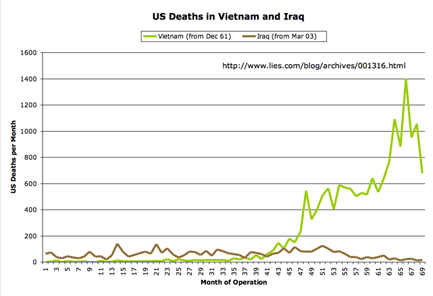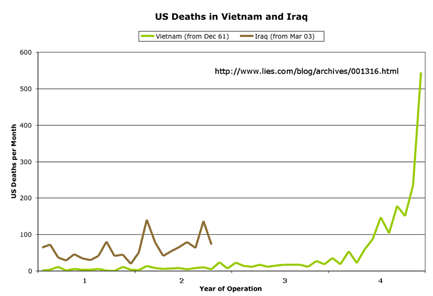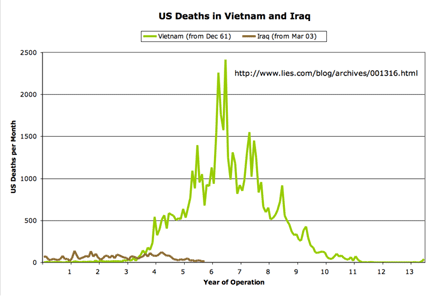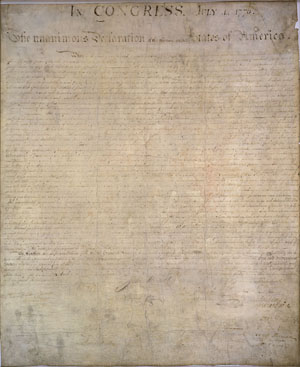Update: Slashdotties (and others) coming via isbushwired.com should know that this item really isn’t about the whole “is Bush wearing a hidden receiver” thing. For stuff on that, see the following more-recent items: Kerry’s pen, Bush’s earpiece and Wiregate!
I think a compelling case can be made that George W. Bush is, in fact, the smallest president in the history of the United States.
Not in terms of physical stature. James Madison is the acknowledged champion in that respect. At 5′ 4″ and about 100 pounds he’d be more likely to be mistaken for a pre-teen female gymnast than the manly leader of the free world, at least in today’s televised political setting.
No, I mean in the sense of moral stature, in the sense people mean when they say that “it takes a big man to admit he’s made a mistake.”
George W. Bush will never make that admission. He will never have that kind of bigness.
The latest incident to highlight this came Thursday, when Bush, asked to comment on the indictment of former Enron chairman Ken Lay, got pissy and stalked away from the podium without answering. (Update: Um, not really, as it turns out. It was Wednesday, and it was more that he left the podium and had the Ken Lay question, to which he didn’t respond, shouted at him as he departed. See update below.)
From Capitol Hill Blue: Angry Bush walks out on media, refuses to answer questions about relationship with Ken Lay. (Update: Again, see below for my own mea culpa re: my poor judgement in being willing to link to and excerpt from the lying fucktards at Capitol Hill Blue.)
A clearly-rattled President George W. Bush walked out of a media briefing Thursday, refusing to answer questions about his close relationship with indicted Enron executive Kenneth Lay, a campaign benefactor Bush nicknamed “Kenny Boy” when the two were up-and-comers in Texas.
The President, visibly upset, stomped off the stage when reporters pressed him about his relationship with Lay and left White House press secretary Scott McClellan to deal with the questions.
Capitol Hill Blue is pretty much just a glorified anti-Bush weblog, so if you’d prefer a more mainstream source for the story, you can go to Telegraph.co.uk (Bush turns his back on Enron questions), or to CNN (White House plays down Bush relationship with Lay).
In honor of my current campaign to immerse myself in US history, you can also dig deeper, into some primary sources. From the post-tantrum press briefing by Scott McClellan:
Q Does the President have anything to say about the unsealing of the indictment against Ken Lay?
MR. McCLELLAN: Well, Bill, I don’t think it’s appropriate for the White House to discuss any specific criminal case. However, I’m more than happy to talk to you about this administration’s commitment to cracking down on wrongdoing. One of the President’s top priorities is to crack down on corporate wrongdoing and strengthen corporate accountability. And we have a record of accomplishment in that area.
This President has worked to go after those wrongdoers and directed his administration to pursue those who are dishonest in the boardroom. The President has made it very clear that we will not tolerate dishonesty in the boardroom.
This administration worked to uncover abuses and scandals in the corporate arena, and certainly the President’s concern is with those workers and other people who have been harmed by corporate wrongdoing. And that’s where his focus will continue to be.
Q But this particular alleged corporate wrongdoer was a personal friend of the President’s, who the President addressed as “Kenny, boy,” who raised a lot of money for the President in the 2000 election cycle, who offered corporate jets to the President for travel in Texas. He did know him well. Does he —
MR. McCLELLAN: Well, you seem to want to be fairly selective there, because let me point out that he was someone who supported Democrats and Republicans, alike, including the President, as you pointed out.
Q Well, is that all the President had to say?
MR. McCLELLAN: That’s how I would describe the relationship, and I think it’s an accurate way to describe the relationship.
Q Does President Bush consider Ken Lay a personal friend? And did the White House have any communication with the Justice Department leading up to the indictment?
MR. McCLELLAN: No. This is a Justice Department matter, and we expect the Justice Department to do their job when it comes to cracking down on corporate wrongdoing. In terms of the question you asked about Mr. Lay, the President has already addressed that, and he described it the way I did, as well.
You can compare this characterization of the Bush-Lay relationship with The Smoking Gun’s collection of correspondence between the two men.
Now, I realize that on some level this is just a big game of “gotcha”, and any politician in Bush’s position would try to avoid being associated with Lay. It’s not the fact of Bush’s avoidance of the Lay tarbaby that I find noteworthy. It’s the manner of his avoidance.
I mean, it should have been easy for him to answer the question with a statement that distanced himself from Lay while not acknowledging any personal wrongdoing, as McClellen basically did on his behalf later on. Politically, that would have made a lot more sense; then this whole story about how Bush refused to answer the question and stalked off would never have happened.
But see, Bush can’t, or won’t, do that. I’m sure there are Bush defenders out there spinning this as a sign of his deep sense of personal loyalty, his willingness to endure political harm rather than say something bad about an old friend. Well, you believe that if you want to. I think it’s just that such a statement would have come too close to an admission of error, something that this president, by virtue of his record-setting lack of moral stature, is simply incapable of doing.
It was easier for him to just walk away, despite the mental gasps of onlookers, answering the underlying question of “can he really be that petty, that vain, that small?” with an emphatic, “yeah, actually, he can.”
The iconic photo of that moment, as shot by the AFP’s Paul J. Richards:
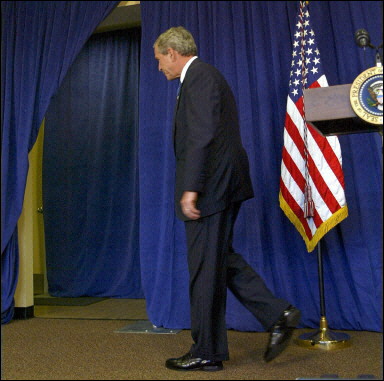
Update: The Capitol Hill Blue story bends things in the interest of crafting a better story. The photo of Bush was made Wednesday, not Thursday, as the CHB piece incorrectly states. The photograph was taken at the conclusion of Bush’s remarks in favor of Senate action on stalled judicial nominees; see White House transcript, video, and audio here: President Bush meets with pending Michigan judicial nominees.
The transcript and video (and audio, presumably, though I didn’t bother to listen) cuts out as Bush concludes his remarks and leaves without taking questions. Presumably reporters did shout one or more Ken Lay questions at that point, which Bush declined to answer.
The Scott McClellan comments were made the next day (Thursday) at the usual White House press briefing, with Bush not present. I thought that was pretty clear when I read the accounts, but my presentation above may have reinforced the misleading language of the CHB piece to imply that McClellan’s cleanup took place at the same venue as Bush’s earlier refusal to answer the Lay questions.
The telegraph.co.uk article linked to above has a significantly more-accurate description of Bush’s action:
Mr Bush walked away from a media briefing, refusing to answer questions about Mr Lay, a close adviser dubbed “Kenny Boy” by the president.
Note also that the CNN piece I linked to talks only about the McClellan comments, and doesn’t mention Bush’s failure to respond to questions about Lay the previous day.
So, to sum up the ways in which the Capitol Hill Blue piece distorted things:
- The briefing at which Bush spoke wasn’t on Thursday, but Wednesday. By itself, not a big deal, but it feeds into the misconception the piece creates that both the Bush actions and the McClellan follow-up happened as part of the same event, rather than as two separate events. Is that important? No, not really. But was it on purpose, as opposed to an innocent accident? Yeah, I think it probably was.
- Bush wasn’t “angry”, “clearly-rattled”, or “visibly upset”, at least not in the portion of the event archived on the White House site. If he became so somewhere between his turning from the podium and the snapping of the AFP photo two steps away, I’d be pretty surprised. To the extent he displayed emotion, it could more reasonably be attibuted to his frustration at the slow pace of Senate confirmation of his judicial nominees.
Bush is still a putz for refusing to answer questions at a press briefing, but that’s not really anything new. Overall, while I stand by my larger point about what the incident says about Bush’s small-minded refusal to acknowledge error, in hindsight, I shouldn’t have linked to or excerpted from the Capitol Hill Blue piece, which is larded with false-to-fact spin in its opening graphs. Sorry about that.
I guess I knew that about Capitol Hill Blue already, given my post-excerpt disclaimer in the original posting. But it’s still a “fool me twice, shame on me” moment. Resolved: no more paying attention to Capitol Hill Blue. Just because I agree with their political position doesn’t mean I have time to waste parsing fact from fiction in the accounts of people willing to consciously mislead.

